
Lying to myself that if I have this I'll finally type up a full story.
29 posts
Personneato - Stories Based On Dreams - Tumblr Blog
aragorn: and then i’ll say “this army” and then you run at them right through me with your army behind you
ghost king, known dramatic bitch who habitually spends like five minutes scaring and chanting at intruders before killing them: oh FUCK yeah let’s do it

Decided to open Batman Arkham Knight to see there's no one on the leader board anymore.

current mood: pretending my WIP is fine while everything’s on fire.


My morning glory doesn’t like the wind chime
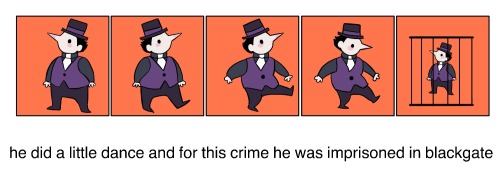
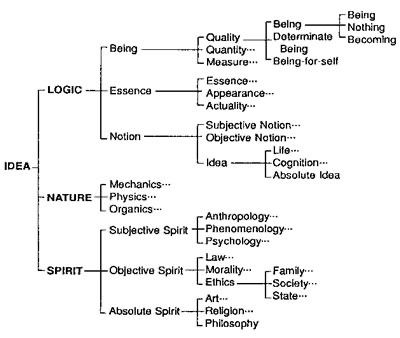
Hegel’s logic deals with the development of God's thinking, prior to the creation of the world, and is called heavenly logic. However, unlike formal logic, it does not merely deal with the formal laws of thought. Although it holds itself to be the development of God's thinking, it attempts to deal with the most universal definitions and laws of reality.
Cat Mimic
I think this is a wonderful awful idea
I had a dream last night that I found a cat statue mimic so I surprise adopted it to leave on my porch to eat the meanies that steal my Halloween decorations.
Will update with concept art soon, it will be terrible. :)
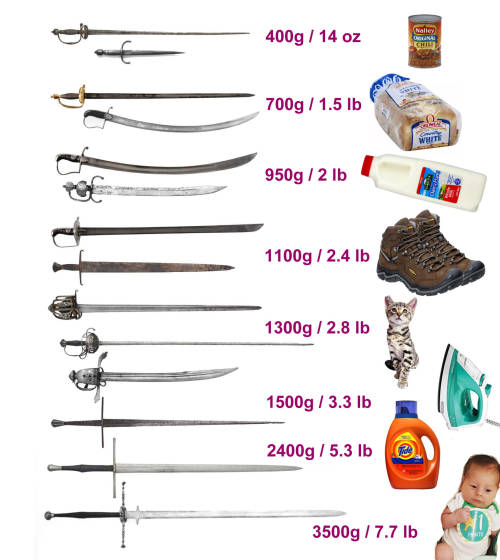
In case you writers ever wondered. Made by Carrie Patrick on Facebook.
Unfun History Facts
TLDR: We had people in space before we let women open a bank account all by themselves
1636 Harvard opened (Calcus wasn’t taught because CALCUS WASN’T INVENTED UNTIL 1672 and wasn’t taught at Harvard until 1797)
1776 USA USA USA
1886 Statue of Liberty was unvieled
1904 NYC Subway was first opened
1914 WWI began
1918 WW! Ended
1919 Prohibition
1920 Women had the right to vote
1927 the first movie with spoken dialogue
1928 sliced bread first sold
1939 WWII began
1941 Mount Rushmoore completed
1945 WWII Ends
1946 Trump born
1946 Bill Clinton born
1947 Hillary Clinton born
1947 Cold War begins
1949 First American Female Ambassedor appointed Helen Engenie Moore Anderson
1952 1st HBomb detonated
1955 Vietnam War begins
1955 Bill Gates born
1957 Sputnik 1 launched
1960 US Embargo of Cuba
1960 Women allowed to open a bank account with their husband’s signature
1961 Obama born
1962 Eleanor Roosevelt died 🙁
1962 Cuba Missile Crisis
1965 1st Pope to visit USA
1969 Moon landing
1973 Watergate
1973 Roe v. Wade
1973 1st USA Space Station (Skylab) launched
1973 Picasso died
1974 ECOA= banks have to let women open a bank account in their name without a man’s signature
1975 Microsoft opened
1975 Vietnam War paused indefinately
1980 John Lennon died
1983 1st cell phone sold
1991 Cold War ended
1998 Google invented
writing is basically me creating fictional characters that are an extension of me but who are way better at handling problems than i’ll ever be
I had a dream that I gradually and inadvertently turned into a version of the whittler witch from Brave, because I bought a cursed cookbook. Everything I baked would turn people into their spirit animal and a lot of my family turned into jackasses and mules and I literally woke myself up laughing.
Also cat carving I'm working on
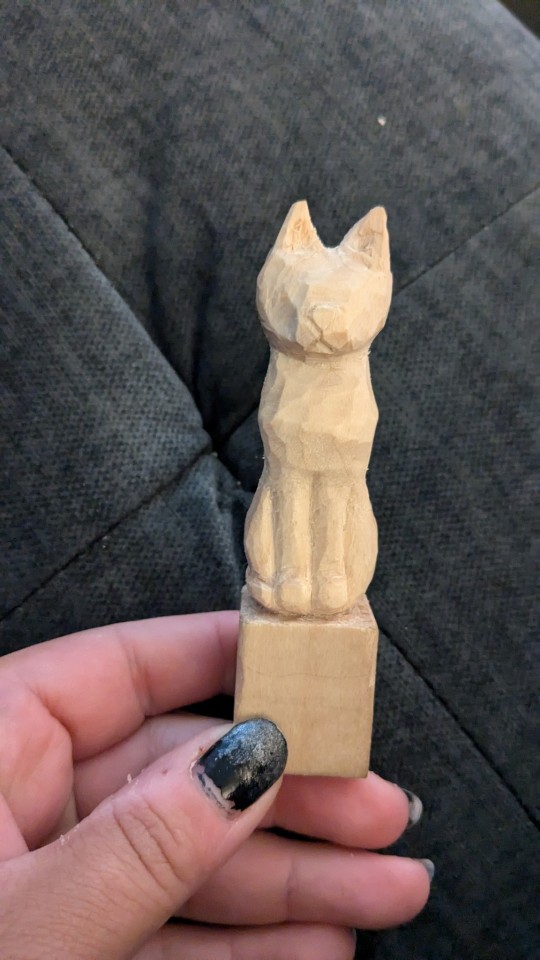
Things Characters Can Do to Show Intimacy

All of these can be used to show platonic, familial, agape, or romantic love depending on context.
cooking a meal for someone, bringing them food, or spontaneously sharing a snack
sharing body heat/warming someone with outerwear like jackets and scarves
fanning them with something if overheated
getting a cold/hot drink for them
offering to carry something, whether it's heavy or just a jacket, to lighten someone's load or free up their hands
changing the subject of a group conversation that will be personally discomforting to someone in the group
making sure to include someone in a group conversation, especially if it's a topic they know they have experience with
waiting for someone to catch up when the rest of the group has walked ahead
remembering someone's food preferences ahead of time when preparing/ordering food
planning trips, whether in a pair or as a group, that provide something positive for everyone to enjoy
procuring personal healthcare items like sunscreen, moisturizer, lip balm, or pain relievers and keeping them on hand for that friend who frequently needs them
making room for someone in a crowded vehicle or on public transit
making room for someone under an awning or in another limited space to help them avoid bad weather
warning or wordlessly covering for someone with a wardrobe/cosmetic malfunction
remembering a small luxury someone mentioned they enjoy, and getting it for them the next time it's in their power to do so
running an errand for someone to make their day easier ('importance of errand : depth of relationship' ratio should be explored)
escorting someone to safety in a sudden unsettling event
escorting someone who is drunk, sick, infirm, injured, or emotionally compromised
asking if light, noise, or other sensory factors are bothering someone and taking steps to make them more comfortable
getting gag gifts for someone to show you reciprocate their sense of humor or quirky self-expression (not everyone does this, not everyone appreciates it, and some people predominantly express love through humor and gag gifts; works well with some characters more than others)
holding someone's hand or arm as reassurance, especially when they are afraid*
using their body to block someone from wind, rain, or heat
picking up a dropped item, or carrying a train or other dragging garment for someone else
returning a recognizable possession to someone who may have lost it
This is an inexhaustible list as humans have many ways of showing love for each other. If you are writing spec fic with non-human characters, you can play with variations on these by remembering three core values the "lover" has to consider:
physical comfort of others
emotional comfort of others
social reputation of others
I'd add "sensory comfort" though I think it's tied to physical and emotional comfort.
Please do not try and force any of these into the mold of the misogyny-based "Love Language" trend. Human emotions and expressions of love are diverse and endless.
*While hand holding can be construed as romantic, in reality it varies. Some cultures do not see this as romantic, and some individuals only mean it as a sign of support or compassion. Same goes for long embraces and kissing, both can be done platonically and of course naturally between close family members or friends.
---
HEY! Writers' Links
Tip Jar! If you enjoy my blog and advice, support me on Ko-fi!🤗
Follow me on AO3 for fanfiction
Visit my Pinterest & Unsplash for visual inspiration
So many open arms, but they aren't reaching for me.
They're just scarecrows in the endless field of my mind.
"But we're here!" They cry.
The crows sit on them
Eating my harvest before it gets to my table.
Oh, how freely the crows flow
Steadily blocking the sky, my sun, the stars
Dimming my world and leaving me baren.
"But we're here!" They say with stitched on smiles
"We're here if you need us!"
-Open Arms
The five stages of writing:
I am a genius.
All of this is a huge pile of crap.
Okay, but it’s not that bad.
It is, it really is that bad.
Screw it. No one will read this anyway so I may as well write the damn thing how I want.
When I get an amazing idea for a novel and sit down to start writing it:
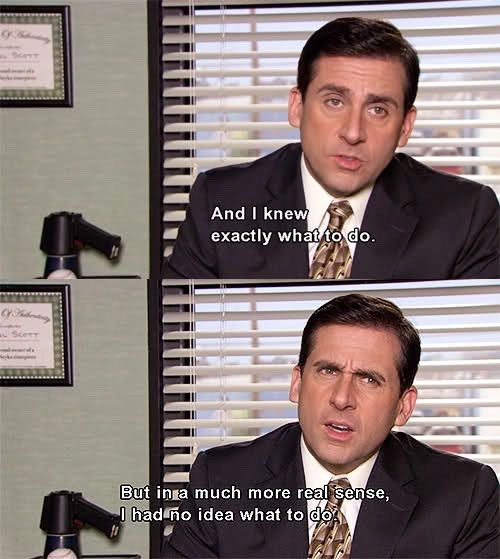
How to write a novel
I was talking to a girl at ComicCon, the kind of person who has a million creative projects at the same time. As many people do, she has a story she wants to write, with amazing characters she wants to share with the world, but writing is hard and a first novel can be daunting. Here’s what I told her.
Now, this applies to the people who REALLY want to see their story done. These are the main pillars of the cathedral that is your story. Let’s begin.
1- YOUR GOAL IS TO WRITE A COMPLETE FIRST DRAFT. It will be shit. But it will be complete. You can build on it and rewrite, but the most important thing is to WRITE TILL THE END OF THE STORY.
2- SIT DOWN AND WORK. That’s the difference between writers and the million people who say they have a story that they’ll write someday.
Alright, let’s get technical, and start by the end.
3- Art is about causing your public to have emotions. Decide right now what emotion you want to leave your readers with when they close your book. Is it happy, sad, bittersweet, hopeful? Pick one. (This can be changed later if you rewrite and find some other ending, but we are working on the first draft.)
— Maybe you have a nice gimmick, a cool idea for a story, like idk, ‘What if you cloned yourself and that clone took over your life’. This is interesting, but it’s not a story in itself. A story needs emotions. If you don’t pick the emotions you want your reader to feel, your idea is just a gimmick.
4- Now that you have the final emotion, decide your ending in accordance to said emotion. Are characters dying? Is the bad guy defeated? Is everyone splitting up or leaving together as a found family?
Then we go back to the beginning.
5- You probably have a million characters you all want to write. Pick one to be your protagonist. Yes, just one. Multi-characters stories are harder to write and demand experience and time. We want this novel to exist, and not be stuck in limbo forever. Anyway, people tend to always prefer side characters. Who has heard of someone having a protagonist as a fave?? Your side characters will be loved, no worry.
How to find your protagonist: It’s the person who makes decisions and makes the plot advance. Simple as that. Not to be mistaken for the leader of a group.
6- Now that you have your protagonist, you decide what is normal for them. That is your beginning.
7- And then, you break that normality in some horrible way that will prevent your protagonist to come back to it. That is your inciting incident.
Then we write the middle
8- You google Three-Act-Structure and get one of these babies.

(But Talhí, I hear you say, why should I follow this? It’s been overdone, and my story doesn’t follow this, and I have more to write than this… Well, that’s your choice. I’m not the boss of you. I’m just saying that this is a solid model for western storytelling and it’s been proven to work time and time again. You can create outside of this, but again, the main goal here is to get your novel on paper. This is a solid template.)
9- You probably have a general idea of events you want to happen in the story. Place these scenes where you feel they should go on the structure. Like, a confrontation with the main bad guy goes in climax of act three, and the confrontation with the main henchman goes to climax of act two, etc. Be mindful of the rising action and tension: a cute misadventure in the woods would probably go earlier in the story than a fight to the death.
10- Now, a secret: What separates bad writing from good writing? Bad writing is adding a bunch of events in the middle and have the characters go through them like a checklist of scenes. You can often see this in movies. But good writing links the events. Each and every event that happens has to be a result of your character making a decision. Then, an obstacle happens, and your character makes another decision, that leads to your next event/obstacle.
11- Another secret: A character will gain power, money, weapons and allies through the story. In videogames, this is useful to defeat the bad guy. But storytelling is not videogames. Having a superpowerful hero at the end is boring. What we want is keeping the reader in suspense. So you’ll have to take everything from them. Leave them powerless and alone. And then, break their leg. I mean, not literally, although you can do that too, but have them super disadvantaged. And then they can use the personal growth they got in the adventure to prevail. (What is more interesting: a character fleeing from a facility but with weapons and kickass moves, or a character fleeing the same facility without weapons or shoes and with a broken arm? Who do you root for?)
Other tricks
The rest of the crew: I go with what Pixar does for characters: Main character gets three or more characteristics. That’s your Woody. Second tier character gets two characteristics. That’s your Buzz. Third tier characters get one characteristic, like Rex and Mister Potato Head. Keep control of your character tiers and never give too much time to the lower tiers ones, it doesn’t help your story.
Herd your cats: Characters will want to wander in every direction, and you’ll want to follow them. Keep them in groups, and even though you can follow a side character for a scene or two, focus 80 to 90% of your story on your protagonist.
DND is not a novel: I’m pretty sure your campaign is super fun, but you can’t just put it on paper and call it a novel. It needs a narrative arc and serious editing. You can use a campaign as a base, but it needs to be worked as a novel, because you’re changing mediums, and a novel has different requirements.
That’s pretty much what I can remember for now. This should help you with the bones of your novel, and you can add the meat on that. I hope it helps. But honestly, the best advice I can give you is
SIT DOWN AND DO THE THING.
Writing Tips: Defeating Writer’s Block
All of those non-writers out there may underestimate the power of block.











Yeah. It’s a problem.
Some days you just don’t know where to begin. Others, you don’t know how to end. And most of the time you’re just stuck in the middle, desperately trying to get from point A to point B.
It’s the monster we all wish wasn’t real.
But this begs the question - HOW on EARTH do we defeat it?
Well, my friends, I have the solution*.
(*please do not sue me if the monster continues to protrude after trying these solutions. I am but a simple writer trying to help out.)
1) GO THE HECK OUTSIDE
I know what you’re thinking. Eeeew. Outside. That’s where humans are. Gross.
But seriously. Go for a walk. Take in some nature around you. It’ll calm you down and you’ll feel much better. Take a notebook with you and people watch. (I recommend sunglasses so it’s not blatantly obvious.)
2) READ A BOOK OR MAYBE TWO OR THREE
Heck, while you’re at it paint a few more paintings for your gallery. Absorb the works of your favourite authors or discover the writing of someone new. Read the genres you aspire to write. Maybe you’ll find some inspiration…
3) REWORK (work work work work) IT
Chances are, if you’re stuck in the middle somewhere, something’s wrong. Read over your work and see if everything make sense and leads to where you want it and need it to go. If not, you may need to make some edits. And that’s productive, too!
4) TALK TO YOUR CHARACTERS
To truly understand the emotions and motivations of your characters, imagine having a conversation with them. This may sound bizarre - but try it. Visualise them and see exactly how they are feeling. Get inside each of their heads, even if they’re not a main character. This will help you understand what they will do next.
5) SUCK IT UP AND SIT RIGHT DOWN
As much as it hurts, sometimes you’ve just gotta force yourself to write. Squeeze those words out your brain and onto that screen. Make that world come to life. Time yourself - non-stop writing for ten minutes straight. Without taking your hands away from the keyboard. Extend it to twenty, thirty minutes. Soon, without realising you’ll have been writing for an hour. And that’s the power of your motivation.
I have some trouble w focusing on my WIP, bc I don't really know how to plot. I know what's the big picture, but I don't know how to put the details, unify the scenes and build the whole story. I feel the plot is quite boring, but I cant nor want change too much cuz then it'll affect the nexts books. It's the story of two friends who have to live far away one of another, and there's a war and they have the chance to met five times before one of them dies. And their lives meanwhile, but idk. Help
It sounds like you have some problems with sub-plots, my friend!
Here are some links that might help!
all about subplots
4 tips to writing subplots
20 basic plots
the mind map method
how to plot a complex novel in one day
a guide to plotting
tips for visual thinkers
p.s.
I know it sucks, but sometimes re-doing the entire plot of your novel is the way to go. If it’s not working, something has to change.
I hope this helps!
Random Dream #5 Part1
---Side bar: This * means mild southern draw used. This ** means very heavy, very cheesey Russian accent is used. Side bar out---
Me and mah drinking buddy weren't hanging out as much, because he started working out more. Totally fine, I don't mind a few rounds by myself. I finished the last half of my bottle, sad to see it gone. I suddenly remembered buying a 'just for rainy days' bottle a while back and cracked the lable off the top.
Before I could even unscrew it, the lid flew up and a genie arose in a cloud of red smoke, flexing as his ominous power blew me back.
** "Why hello dere, little won! I am dah Russian Genie here so solve all of your little person problems! Or, at least 3 ov dem. How may I being helping you this day?" He leaned in close as smoke billowed about and made me dizzy. I stared at my hands and watched my fingers to see if they blurred in and out. I must be drunk.
"Ok, that's enough for tonight." I aburptly stood and put the lid on in one swift move making the genie disappear instantly along with the smoke and odd mood lighting change. I curled up in bed and drifted off sad to be alone again.
After another long day of work, I flip into my chair somehow forgetting what transpired last night and grab the bottle just for the lid to fly off again.
** "Why hello again! I was afraid you had forgotten about me, the Russian Genie!" Less smoke poured out but the same huge genie squeezed out and began flexing his arms up and down to better show off his huge muscles. Frankly, I just wanted a drink so I poured a shot into my glass and threw it back. I stared at him and missed my quieter drinking buddy.
** "So, what can the huge and powerful, great and mighty Russian Genie being doing to help you today, my little won?" He leaned in and waited eagerly for my response.
"Honestly, I just came here to drink." I poured two more drinks, pushing the second one to him.
** "Oh, that is very kind ov you, little won!" He gladly picked up the glass, clinking my glass. ** "To the little won!" And threw his drink back. He made a jar of pickles appear and we ate one after the shot because ** 'that is how we do it in Mother Russia!'





Hey, just in case anyone is confused (I mean, we ARE both middle aged white guys with gray beards), this isn't me. This is @effinbirds and I'd have linked to him in my initial post if I'd realized he had a Tumblr. So go follow him on Tumblr AND Twitter, because dude is cool af.
Hi! I was just wondering, what's the best way to make/write out a plot?
Guide: How to Outline a Plot
The best way to write out a plot isn’t the same for everyone, and sometimes it’s even different from story to story. There are lots of different methods, and most writers use a combination of them, so you just have to try different things to see what works best for you. Here are some of the most common methods:
1. Just Write
Some writers are what’s known as “pansters” meaning that once they have a story idea in mind, they prefer to “fly by the seat of their pants” and start writing without any planning in place. The key to making this method work is to remember that you’re only writing the first draft. Nothing you’re doing is set in stone, so don’t feel the story has to be perfect in one shot. Follow your gut and write the story to the best of your ability. Worry about tightening and polishing in subsequent drafts.
2. Synopsis
Some writers prefer to start by writing beginning to end summary of the story, describing all the important details and events in the order that they unfold. Summaries can be a great way to flesh out an idea for a plot, and they can also serve as a nice guideline if you want to “just write” your story but need a bit more structure first.
3. Old-Fashioned Outline
Do they still teach outlining in school? I don’t even know… when I was a kid, we learned how to do outlines with Roman numerals for the main points, capital letters for the minor points, and numbers for sub-points. If you’re good at outlining, this can be a great way to outline your plot.
4. Timeline
Creating a timeline for your story can be a great way to map it out. All you need is a beginning event, climax event, and end event. From there you can start filling in the events that follow and precede those events. Even if you don’t know the exact date for when a scene takes place, you can still mark it down in the right general place.
5. Scene List
If you have a pretty good idea of the scenes that need to take place, or at least a good number of them, you can start by writing out a scene list. It’s nice to do them in a table if you can so you can organize important details, like chapter, scene number, date and location, who’s in it, and then a short summary. Though, how you organize it is up to you. If you prefer, you can just write the scene number and then a brief summary.
6. Story Structure Map
Some writers like to map out their story according to whatever story structure they want to follow. They’ll pull up a graphic or chart of the structure, transcribe it onto paper or into a document, and then note each relevant event for each structure “mile marker.”
7. Subway/Tube Map
This is a new one I recently heard about. I haven’t had a chance to try it yet, but I think it’s fascinating. And there are even subway map creators you can use if you don’t want to draw it out. Ultimately, the goal is to map out the events of your story in the style of a subway/tube map. This method makes it easy to illustrate subplots and see how they relate to the rest of your story.
8. The Mind Map
Mind maps can be a fantastic way to get the most important parts of your story out on paper, and to start figuring out where other parts fit in and how they relate to everything else.
9. Index Cards
Some writers have luck writing out key scenes, moments, bits of dialogue (or anything else they have in mind) on individual index cards, which can then be laid out in order on a table, allowing for cards to be easily moved around, added, subtracted, etc. until a more complete story starts to emerge. Some writers even invest in giant cork boards for this purpose. Others use a dry erase board and draw out the “cards” instead. A lot of story writing software, such as Scrivener, even includes digital bulletin boards and index cards that you can use to visualize your story.
10. Method/Theory/Template
There are numerous methods/theories/templates dedicated to building/fleshing out plots. Some to look into:
- The Snowflake Method- Dramatica Theory- Save the Cat! for Novels- The Hero’s Journey
If one of the above doesn’t work for you, you’re sure to find even more ideas online. Try doing a search for “how to outline a plot” or “outlining a novel” to see what comes up. You might even try searching for your favorite author’s name plus “outlining” to see if they’ve done any posts sharing their own methods. You may also want to look into books, software, and apps/web sites that offer ways to help you plot your story.
Good luck!

